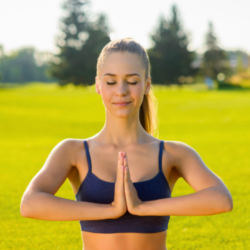Vivimos en un mundo donde todo va rápido: las responsabilidades del trabajo, la familia, los compromisos sociales y las incontables pequeñas tareas que llenan nuestra rutina diaria. En medio de este torbellino, es fácil olvidarnos de nosotras mismas, perder de vista lo que realmente necesita nuestro cuerpo, las pausas necesarias para respirar y reconectar con nuestro interior. Aquí es donde entra en juego una práctica atemporal que combina fuerza, flexibilidad y conciencia corporal: el Pilates.
El Pilates no es solo una disciplina que mejora la postura y fortalece los músculos; también es una forma profunda de autocuidado. A través de movimientos controlados y una respiración consciente, esta práctica te invita a escuchar a tu cuerpo, a descubrir tus límites, pero también tus fortalezas. Es un espacio para hacer una pausa y conectar con lo que realmente importa: tu bienestar físico y emocional.
En este artículo, exploraremos cómo el Pilates puede ayudarte no solo a mejorar tu forma física, sino también a cultivar el amor propio y reconectar con tu cuerpo de una manera más consciente y amorosa.
¿qUÉ ES EL PILATES?
El Pilates es un sistema de ejercicios desarrollado por Joseph Pilates a principios del siglo XX. Influenciado por diversas disciplinas como la gimnasia, el yoga y las artes marciales, Joseph Pilates creó una serie de movimientos orientados a fortalecer el cuerpo desde el centro, es decir, los músculos estabilizadores del abdomen, la parte baja de la espalda, las caderas y los glúteos. Además, el Pilates pone un gran énfasis en la respiración controlada, convirtiéndolo en una práctica que conecta profundamente la mente con el cuerpo.
Uno de los principales beneficios del Pilates es que puede adaptarse a cualquier nivel físico. Ya seas principiante o tengas años de experiencia en el mundo del entrenamiento, siempre encontrarás una manera de realizar los ejercicios según tus necesidades y capacidades.
Beneficios físicos del Pilates
Uno de los mayores atractivos del Pilates es su enfoque en fortalecer el core (zona media del cuerpo), lo que mejora la postura, reduce el riesgo de lesiones y favorece un mayor control corporal. Aquí te compartimos algunos de los beneficios más destacados del Pilates:
- Mejora de la postura: Muchos pasamos horas frente a una pantalla o en posiciones que afectan nuestra columna. El Pilates fortalece los músculos del core, ayudando a mantener una postura erguida y saludable. Con el tiempo, notarás cómo tu cuerpo se alinea de forma más eficiente.
- Fortalecimiento muscular: Aunque no es una actividad asociada al levantamiento de pesas, el Pilates utiliza el peso corporal y movimientos controlados para tonificar los músculos de forma efectiva, especialmente en el abdomen, la espalda baja, las caderas y los glúteos.
- Flexibilidad y equilibrio: El Pilates incluye ejercicios de estiramiento que mejoran tu flexibilidad y equilibrio, permitiendo que tu cuerpo se mueva con más libertad y control.
- Reducción del riesgo de lesiones: Al trabajar la estabilidad del core, la flexibilidad y la fuerza, el Pilates ayuda a prevenir lesiones tanto en las actividades diarias como en otros entrenamientos físicos.
- Conexión mente-cuerpo: El Pilates requiere concentración y conciencia en cada movimiento, lo que favorece una mayor comprensión de tu cuerpo y sus capacidades.


Pilates como autocuidado
Más allá de los beneficios físicos, el Pilates ofrece una oportunidad única para la autorreflexión y el autocuidado. En un mundo que nos exige ser productivos y responder constantemente a expectativas externas, el Pilates brinda un momento de pausa e introspección. Aquí es donde entra en juego la conexión entre el Pilates y el amor propio.
Al practicar Pilates de forma regular, no solo mejoras tu salud física, sino que también estás haciendo un compromiso con tu bienestar. Así es como el Pilates puede ayudarte a desarrollar un mayor amor propio:
- Escuchar a tu cuerpo: El Pilates te enseña a estar presente, a reconocer las necesidades y límites de tu cuerpo. En lugar de forzar o ignorar el dolor, aprendes a respetar las señales de tu cuerpo y moverte a un ritmo que sea adecuado para ti.
- Fomentar la paciencia y la compasión: A medida que avanzas en la práctica, notarás que algunos movimientos se vuelven más accesibles con el tiempo. Esta mejora progresiva promueve la paciencia y la autocompasión, recordándote que el progreso es un camino, no una meta inmediata.
- Crear una rutina de autocuidado: Dedicar tiempo al Pilates con regularidad es un acto de autocuidado. Es una forma de decirte a ti misma que tu bienestar importa y que mereces sentirte fuerte, equilibrada y conectada contigo.
Cómo incorporar el Pilates a tu rutina
El Pilates puede practicarse en distintos entornos: en un estudio, en casa o incluso en clases virtuales a través de nuestra plataforma online. No importa dónde estés o cómo sea tu rutina diaria, puedes encontrar una práctica de Pilates que se adapte a ti.
En nuestra plataforma, ofrecemos clases de Pilates para todos los niveles. Ya seas principiante o tengas experiencia, encontrarás sesiones enfocadas en distintos aspectos de la práctica: desde el fortalecimiento del core hasta la flexibilidad y la relajación. Con instrucciones guiadas y la posibilidad de avanzar a tu ritmo, incorporar el Pilates a tu rutina de autocuidado será sencillo y gratificante.
Conclusión
El Pilates es mucho más que un entrenamiento físico; es una herramienta poderosa de autocuidado y amor propio. A través de esta práctica consciente, no solo mejorarás tu salud física, sino que también desarrollarás una conexión más profunda contigo misma, fomentando la paciencia, la compasión y una mayor sensación de bienestar.
Si estás lista para cuidar tu cuerpo y mente a través del movimiento, te invitamos a unirte a nuestras clases de Pilates en la plataforma. Regálate tiempo, respira profundo y reconecta contigo de una manera más amorosa y consciente.
Te lo mereces.
Visita nuestras clases de pilates y explora todo el contenido disponible en nuestra plataforma. Baile, Fitness, Yoga, Pilates, apoyo emocional y mucho más.

